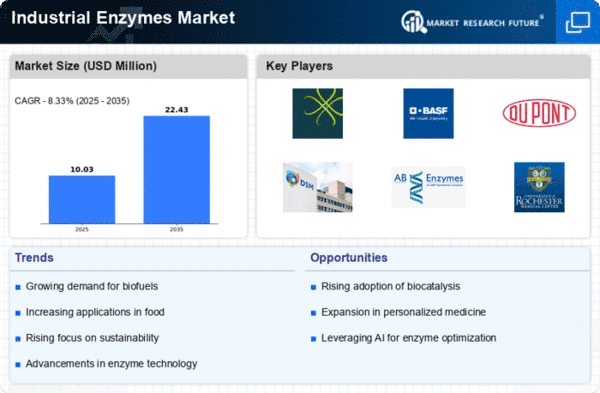Top Industry Leaders in the Industrial Enzymes Market

The Industrial Enzymes Market: An In-Depth Analysis of the Competitive Landscape
The global industrial enzymes market has witnessed remarkable growth in recent years, fueled by their diverse applications across various industries, including food and beverages, textiles, biofuels, and pharmaceuticals. As the market continues to expand, key players are strategically positioning themselves to tap into emerging opportunities. This article provides a comprehensive examination of the competitive landscape, encompassing key players, strategies, market share factors, emerging companies, industry news, and a recent development in 2023.
Key Players:
Chr. Hansen Holding A/S (Denmark)
BASF (Germany)
DuPont de Nemours (US)
Koninklijke DSM N.V N.V (Netherlands)
Novozymes (Denmark)
Advanced Enzyme Technologies Ltd (India)
Adisseo (China)
Dyadic International Inc (US)
Kerry Group PLC (Ireland)
Amano Enzyme Inc (Japan)
Strategies Adopted:
The industrial enzymes market have implemented various strategies to maintain and enhance their market positions. These strategies encompass research and development investments, product innovation, strategic partnerships, and geographical expansion. For example, Novozymes A/S has focused on launching novel enzyme formulations tailored to specific industrial processes, strengthening its market presence through strategic collaborations with key stakeholders, and expanding its global footprint to capitalize on regional market opportunities.
Market Share Analysis:
The industrial enzymes market involves evaluating multiple factors that impact competitive positioning. Key considerations include the efficacy of enzyme products, research and development capabilities, cost-effectiveness, and the ability to address diverse industrial applications. Companies that effectively address these factors are better positioned to capture and retain a significant share of the market. Additionally, responsiveness to evolving industry trends, such as the demand for sustainable and bio-based solutions, contributes to a competitive advantage.
News & Emerging Companies:
The industrial enzymes market has seen the emergence of new and innovative companies, reflecting the industry's adaptability and potential for growth. In 2023, emerging players like Ecozyme and BioCatalysts gained attention for their commitment to sustainable enzyme production and unique enzyme solutions for niche applications. These newcomers contribute to the market's diversity, challenging established players and fostering innovation in the industrial enzymes sector.
Industry Trends:
The industrial enzymes market revolve around sustainability initiatives, technological advancements, and market expansion. Key players are investing in research and development to enhance enzyme production processes, exploring sustainable sourcing practices, and expanding their portfolios to meet the evolving demands of industries aiming for eco-friendly solutions.
Current investment trends also highlight the significance of digitalization and data-driven solutions in optimizing enzyme production and application processes. Companies are leveraging advanced analytics and artificial intelligence to improve efficiency, reduce production costs, and provide customized enzyme solutions for specific industrial requirements.
Competitive Scenario:
The industrial enzymes market is marked by intense competition among key players striving to establish themselves as leaders in this rapidly evolving sector. Companies are strategically differentiating themselves through a combination of technological innovation, product quality, and market positioning. The market is shaped by factors such as the ability to address multiple industrial applications, sustainability practices, and the development of enzymes with enhanced functionality.
Recent Development
The industrial enzymes market was the successful commercialization of a novel enzyme formulation by DuPont de Nemours, Inc. This formulation demonstrated enhanced stability and efficiency in the biofuel production process, providing a breakthrough solution for the renewable energy industry. The development marked a milestone in enzyme technology, addressing challenges associated with enzyme activity under harsh conditions prevalent in biofuel production.
DuPont's strategic move highlighted the company's commitment to advancing sustainable solutions and catering to the growing demand for renewable energy sources. The enhanced enzyme formulation showcased the potential to improve the efficiency and economic viability of biofuel production, contributing to the broader goal of reducing reliance on fossil fuels. This development positioned DuPont as a frontrunner in providing innovative enzyme solutions for the bioenergy sector, reinforcing its competitive standing in the industrial enzymes market











